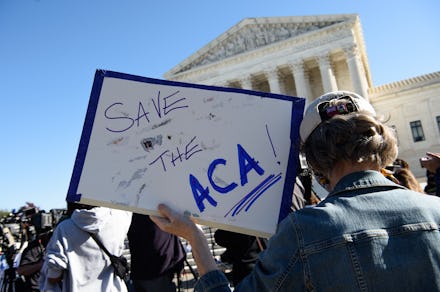It's looking like Obamacare will survive the new Supreme Court

On Tuesday, the Supreme Court began hearing oral arguments in the latest Republican-backed case to end the Affordable Care Act, more commonly known as Obamacare. Besides the case being yet another attempt from Republicans to eliminate the health care law, it’s also the first major issue to come before the newly minted 6-3 conservative majority on the Supreme Court, and the first opportunity for Justice Amy Coney Barrett to weigh in on a high-profile issue. The possibility that the high court would overturn the ACA was a major concern for liberals after Barrett’s rushed confirmation — but if the opening day of oral arguments is any indication, it seems like the court will leave the ACA alone for now.
Since the Affordable Care Act’s passage in 2010, the Republican Party has put the law through a veritable legal saga, fighting against the ACA in the Supreme Court several times over the past decade. This week’s case focuses on the ACA’s “individual mandate” clause, which originally created a penalty that most Americans had to pay if they didn’t have some kind of insurance, either through the ACA marketplace or via a private insurer.
The fine was meant to incentivize generally healthy and/or uninsured Americans to buy into the health care plan, which helps keep costs low for people with pre-existing conditions or other health issues. But in 2017, the Republican-led Congress reduced that tax to $0, hoping to undermine the enrollment incentive and while also throwing the validity of the “individual mandate” portion of the law into question. According to CNN though, more than 11.4 million people enrolled in the ACA in both 2019 and 2020 even though the penalty was no longer in place, suggesting that Americans are happy to enjoy affordable health insurance and need little incentive to do so.
But in this week’s SCOTUS case, led by Texas alongside more than a dozen other states, Republicans are arguing that the “individual mandate” clause is now unconstitutional. And based on that, they’re arguing that the entire 900-page law expanding health care access is now unconstitutional. CNBC reported that all six of the court’s conservative justices “seemed sympathetic” to the case’s arguments, but that both Chief Justice John Roberts and Justice Brett Kavanaugh don’t seem convinced that issues with the one clause justify overturning the entire law. It’s worth noting that Roberts actually broke with his conservative colleagues in a 2012 Supreme Court case against the ACA, siding with the court’s liberal justices as the deciding vote that ultimately preserved the law.
If they side with the court’s three liberals — Justices Stephen Breyer, Sonia Sotomayor, and Elena Kagan — Roberts and Kavanaugh would ensure the 5-4 majority needed to keep the law intact. Assuming this unexpected but certainly welcome tone holds through the entirety of oral arguments, and the conservative-leaning court does in fact rule to keep the Affordable Care Act, it could suggest that perhaps conservative opinions around health care access could be shifting ever so slightly. Maybe the presumption that all conservatives and all Republicans are against the ACA no longer holds water; maybe coronavirus’s nearly year-long ravaging of the country and the reality of the nation’s rising medical debt has made opinions on health care more fluid.
Could this changing landscape soften partisan politics just enough for progressive Democrats to build on popular opinion and momentum and make a real push for Medicare-for-All? It’s premature to say all that based on one day’s worth of oral arguments, but the idea of government-provided health care has been steadily gaining popularity. Despite Trumpism’s lasting impact, it's worth asking whether with the right strategy, Medicare-for-All might not be the pie-in-the-sky policy proposal some politicians would have us all believe.